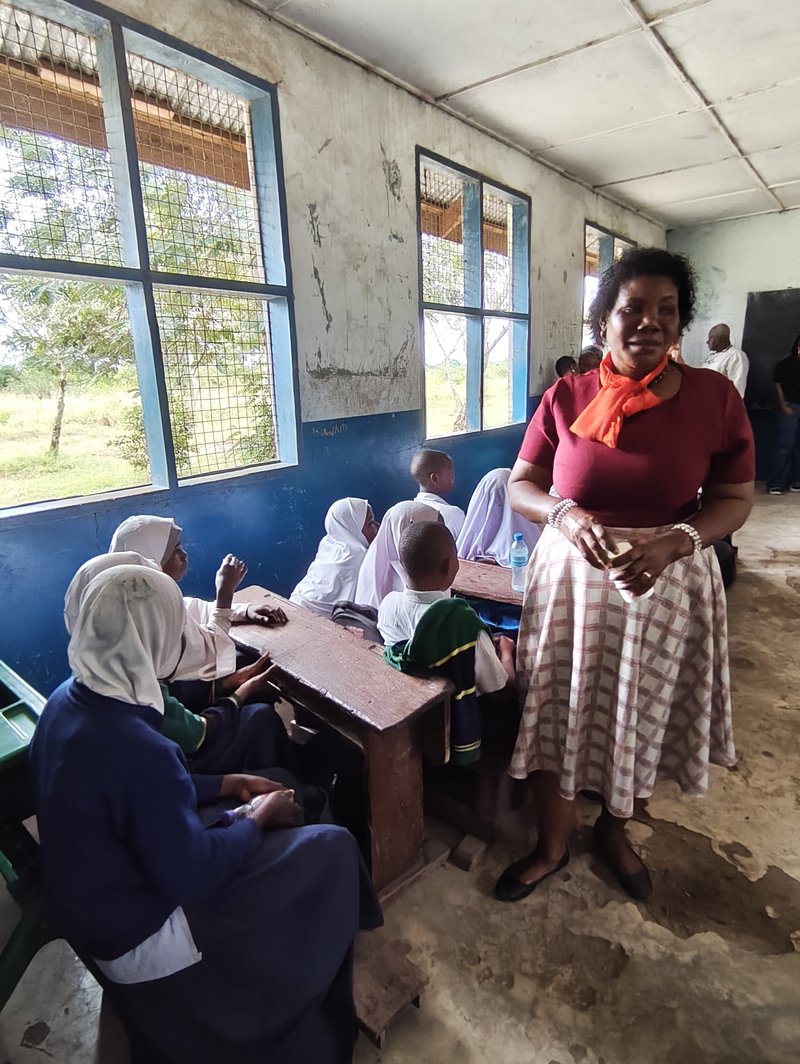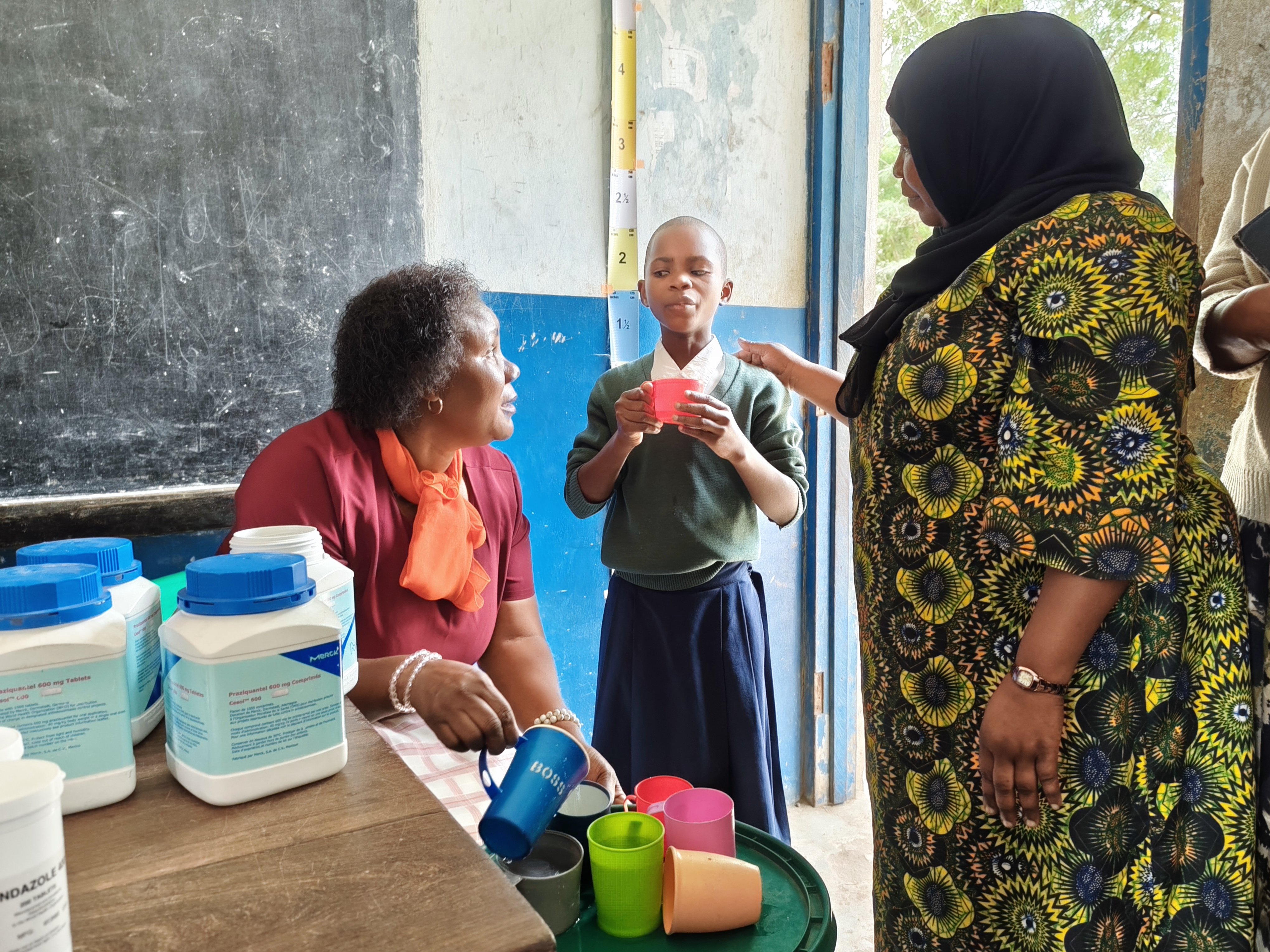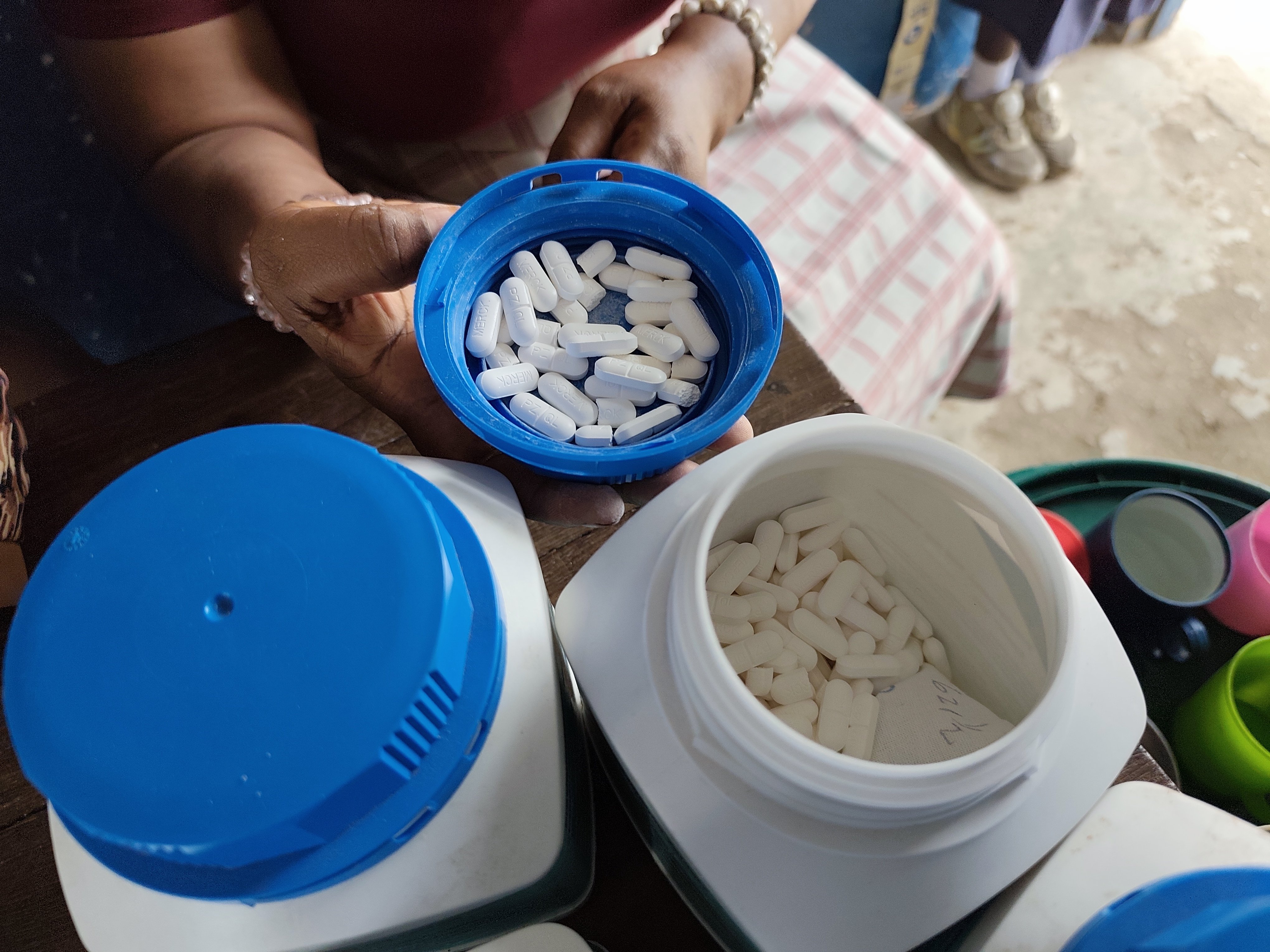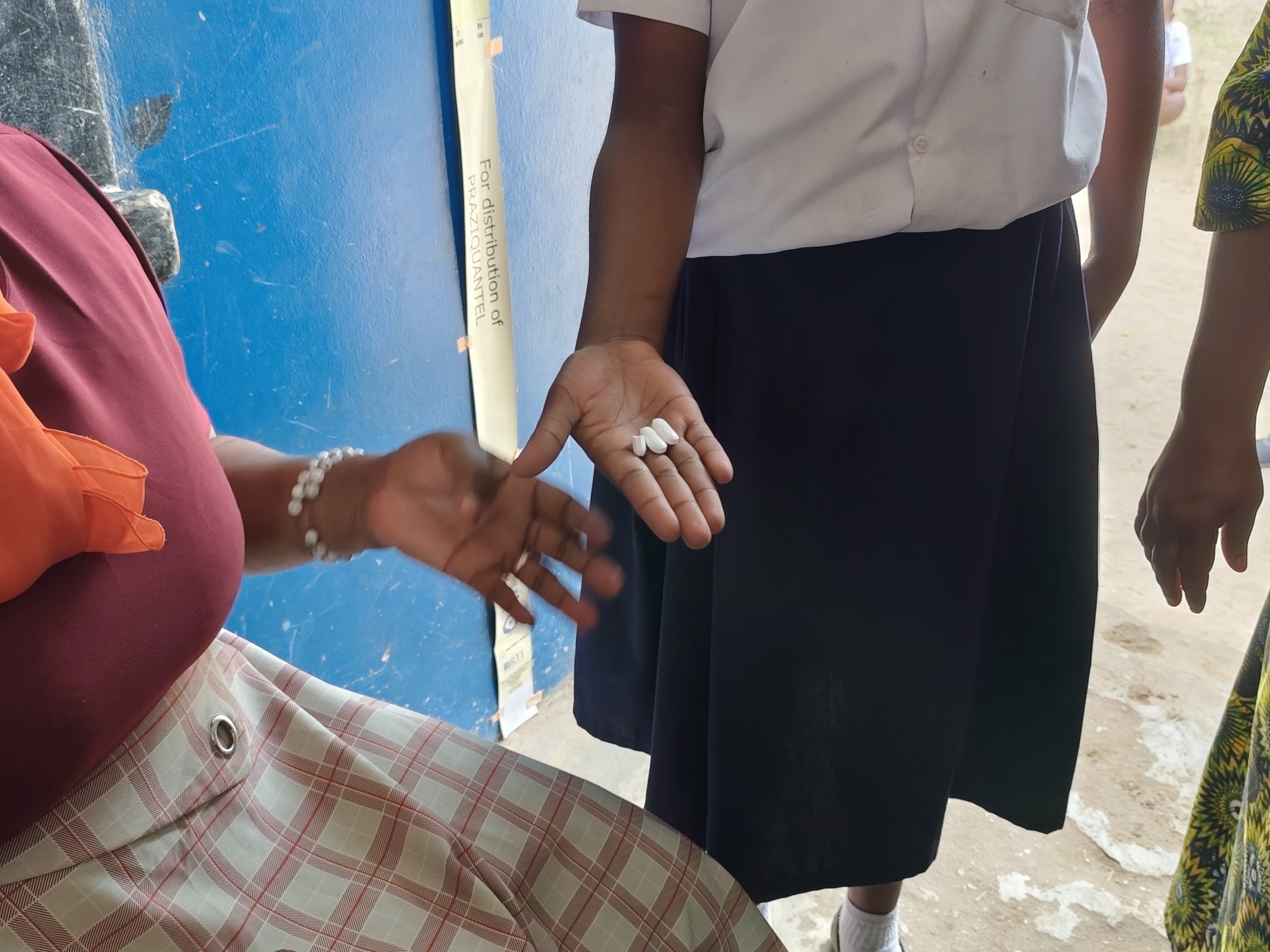
A teacher hands out drugs during a mass drug administration campaign at Vikuruti Primary School, Pwani Region, Tanzania
James Ochweri/Uniting to Combat NTDs
At Vikuruti Primary School in Tanzania’s Pwani region, a group of children pause with quiet excitement, waiting for the small pills that promise a healthier future. This scene is part of a larger story of innovation and resilience in Tanzania’s fight against neglected tropical diseases (NTDs), where strategic focus and local ownership are transforming lives.
NTDs are a group of 21 preventable and treatable illnesses that impact over a billion people worldwide. Tanzania faces a significant burden, with more than 15 of these diseases being endemic. Since 2009, the country has implemented an integrated control programme to control and eliminate the diseases.
Tanzania has achieved remarkable success in its elimination efforts. By 2024, 39.4 million fewer people required treatment compared to 2021. This significant reduction is particularly evident in lymphatic filariasis and trachoma, where 89% and 90% of the initially at-risk population, respectively, no longer require regular preventative treatments, also known as mass drug administration (MDA).
Targeted Strategy for Maximum Impact
With the burden of NTDs being felt strongly on the African continent alongside the realities of steadily reducing global development aid, Tanzania stands as a beacon of innovation in both domestic resource mobilisation for NTD elimination and ensuring that donated drugs reach the communities most in need. Instead of stretching limited resources across all 15 NTDs found in the country,
Dr. Clara Jones Mwansasu, the NTD Programme Manager from the Ministry of Health notes that the programme strategically concentrates on five NTDs which can be prevented and treated via MDA: lymphatic filariasis, river blindness (onchocerciasis), bilharzia (schistosomiasis), intestinal worms (soil-transmitted helminths), and trachoma.

James Ochweri/Uniting to Combat NTDs
Local Funding, Local Ownership
Domestic funding for NTD programmes in Tanzania has seen a significant rise from just 0.6% previously to 25% in 2025, with projections showing some district councils could reach 60% by 2026. Through the Council Comprehensive Health Plan (CCHP), local governments are now allocating dedicated budgets for NTD interventions, helping ensure programme continuity even when external donor support fluctuates.

James Ochweri/Uniting to Combat NTDs
A School’s Transformation
At Vikuruti Primary School, teachers hand out Albendazole tablets, a treatment for intestinal worms. They then instruct the children to line up one by one to get their age and height recorded for a Praziquantel dose - preventative treatment for schistosomiasis - which is given based on those two factors. Tanzania has adopted this mode of to ensure that the life-changing drugs, which are generously provided to the Ministry of Health by global pharmaceutical companies, reach the communities most in need.
Intestinal worms, also known as soil-transmitted helminths, thrive in warm, humid soil where sanitation is poor. The most common types – roundworm, whipworm, and hookworm – infect people through contact with contaminated soil. In children, these worms hinder nutrient and vitamin absorption, leading to malnutrition, stunted growth, and impaired intellectual development.
Schistosomiasis, or bilharzia, is contracted when people come into contact with water contaminated by specific snails carrying the disease-causing parasites. These parasites enter the body through the skin and travel to the urinary or intestinal system, causing chronic ill health. This infection can also lead to malnutrition, school absenteeism, and potentially impaired intellectual development. Persistent and severe bilharzia infections can result in chronic and irreversible diseases later in life, such as liver scarring, bladder cancer, or kidney failure.
"Tests conducted earlier in the year showed 12 children out of 200 in a school had schistosomiasis, necessitating the resumption of the MDA" says Dr. Eligreta Mnzava, the Regional NTD Coordinator. The MDA programme ran between 2022 and 2023 then stopped because the surveillance showed it was no longer endemic.
Since resumption in early 2025, follow up tests have shown that only three out of 300 children in the same school had schistosomiasis and community health workers will follow up with them closely to make sure that they get treatment.
The teachers are already witnessing significant improvements in student health and learning outcomes, with student absenteeism dramatically falling from an initial ten percent to approximately two percent, thanks to these crucial treatments. Sustained investment in programmes like MDA in schools initiative offers compounding benefits for Tanzania. Beyond fostering healthier and more equitable communities through improved learning and health, these interventions immediately enhance children's future earning potential by up to 20%, thereby strengthening Tanzania's economy and society.
Prevention and response
On the prevention side, the Ministry of Health has also worked with the Ministry of Education to integrate topics into the science curriculum about health education which cover diseases like schistosomiasis and intestinal worms. “We teach them how to prevent the infections and also teach them the signs of infection so that when the children notice them, they can go to their parents to ask to go see a doctor," said Mr. Chengele Magungu Beno, Principal of Vikuruti Primary School.
Challenges and Solutions
The school is also engaging in community awareness about the MDAs to counter stigma and help the parents to understand why their children need to get the drugs.
“Parents were afraid the drugs would affect their children’s health in various negative ways but we worked with the parents' representatives to ease their worries and ensure that all the children in the school are part of the MDA,” Mr. Beno added.
Community Champions
Community health workers and community leaders are also part of the solution, doing sensitisation campaigns in the communities before MDAs are launched. Pendo, a volunteer community health worker in Mlandizi ward has seen the community change over the last 30 years, due to the MDAs that he supports.
"We used to see lots of children having intestinal worms and other complications but now, we don’t see that as much." he says.
Pendo mentions drug availability as a challenge they faced recently. "The children and the community now know about the drugs and their benefits. We would like to do the MDAs often but sometimes we can't get enough drugs to do them." he concluded.

James Ochweri/Uniting to Combat NTDs
Why Continued Investment Matters
The integrated MDAs that the Ministry of Health has been implementing has had a huge impact on the communities that need them most. But with the aid withdrawals in early 2025 majorly affecting drug distribution programmes across the continent, African countries find themselves battling to ensure that the large numbers of treatments for various NTDs, that are donated yearly by the global pharmaceutical industry, do not go to waste.
With every US $1 invested in preventative chemotherapy NTDs yielding US $25 in estimated net benefit for affected individuals, it is clear that prevention and control of NTDs still remains one of the best investments in global public health. The continued drug donation programmes are a crucial part of this ongoing success story. For individuals, receiving these drugs means a life without fear of becoming disabled or losing a livelihood from preventable disease.
“The drugs are important to us because if the education levels rise, our country will prosper," says Mr. Beno
Tanzania’s story shows what’s possible when communities, governments, and donors work together. Continued investment in drug donation programmes isn’t just smart, it’s transformative. Let’s ensure no child is left behind in the fight against NTDs.